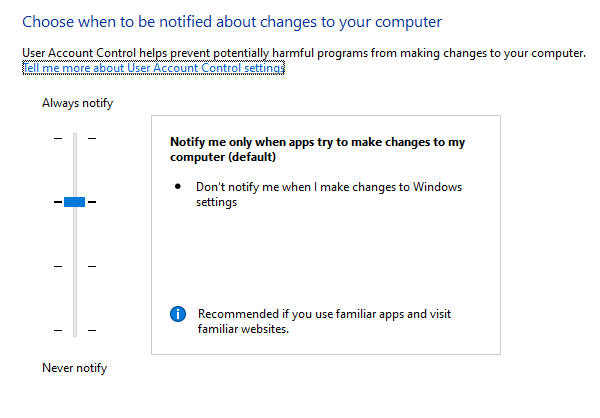If you notice an application icon or system icon with a blue and yellow shield (Icon overlay) at the corner, it means that the applications need to run with administrator privileges. When you run such an application, you will get a UAC prompt. While they are there for security reasons, it gets annoying to get the prompt every time you run it. In this post, we will show how to remove the blue and yellow shield from an icon in Windows 10.
Why is UAC important?
UAC or User Account Control setting makes sure that no program can run with admin privileges unless allowed by the user. It prevents potentially harmful programs from making changes to your computer. It is best to keep this setting to default and not make any changes unless extremely necessary.
Remove the blue & yellow shield from an icon
The blue and yellow shield is an Icon Overlay. If you wish to remove it, try our suggestions – one is sure to help you:
- Reinstall application and set Compatibility
- Change UAC Level
- Use NirCMD to remove shield but keep UAC
- Bypass UAC for these programs.
Once you have done this, you may need to clear the Icons cache.
1. Reinstall application and set Compatibility
The application icon on which you notice these shields are usually shortcuts. They are to signify that UAC prompt will appear every time you run the application.
- First, uninstall the application, and then reinstall it. Make sure not to run the application unless the rest of the steps are complete.
- Right-click on the shortcut icon.
- Select Properties from the menu.
- Switch to the Compatibility tab and uncheck the box which says Run this program as an administrator.
- Click Apply and OK.
It will remove the shield icons from the application icon in Windows.
2. Change UAC Level
Use WIN + Q to launch search bar. Type UAC to reveal the User Account Control setting. Once you open the setting, you can lower the level.
Choose the setting which says – Notify only when apps try to make changes to my computer. Once you choose this option, you will not get any warning when you run the apps with a blue or yellow shield icon. However, this will become a permanent setting, which can be dangerous if you accidentally run a rouge application.
3. Use NirCMD to remove icon but keep UAC
NirCMD is a command-line utility which allows the user to run applications without displaying any UAC. We can use this to disable the UAC prompt. However, it only bypasses the prompt but makes sure to run it with elevated privileges as expected.
Download nircmd.exe from here and copy it into your C:\Windows folder
Open the Properties dialogue box for the shortcut for which want to rid of the shield symbol
Click ‘Change icon’ and confirm with ‘OK’ right away without any changes
Add ‘nircmd elevate ‘ at the beginning of the target application path-
nircmd elevate <Path to application EXE file>
Confirm with ‘OK.’ The shield symbol will be gone.
The admin privileges will make sure to launch the program with admin privileges, but without any UAC.
4. Bypass UAC for these programs
Read our exhaustive post to find out how you can bypass UAC for these applications.
If the above steps resolve the UAC prompt, but the shield icon remains, you may have to clear the Icon cache.
We hope you find this guide easy to follow and you were able to remove the remove blue and yellow shield icon from those applications.
